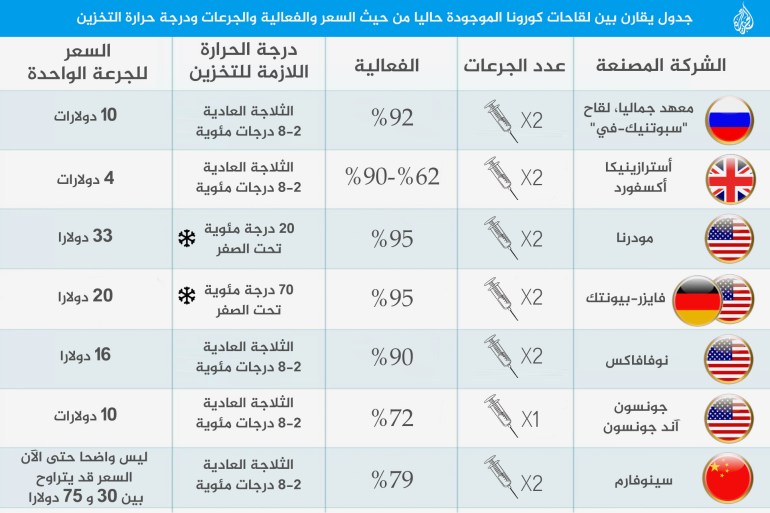The mutated strains of the Coronavirus have posed great challenges to researchers and vaccine manufacturers, especially after it was revealed that some of these strains may reduce the effectiveness of available vaccines.
Are new vaccines being developed?
3 German scientists answer the question.
The increasing number of new mutations from the Coronavirus presents major challenges for researchers, vaccine manufacturers, and vaccine licensing institutions.
This is what was reached by 3 prominent German virologists, who were invited by the "Science Media Center" to a virtual press conference on February 23, 2021, and the results were published by the Deutsche Welle website on Sunday.
Scholars Klaus Ceschotik, Marilyn Addo and Ugur Shaheen participated in the conference.
The report says that we can keep calm because everyone agrees on the following point, which is that "we have 3 approved vaccines within one year," confirmed Marilyn Ado, professor of virology at University Medical Center Hamburg-Eppendorf.
"It's a great achievement and during negative discussions now we forget that we are achieving successes that we celebrate every day," Addo said.
Addo continues to explain her idea that even if viruses continue to mutate, that will not make medicine stand impotent, as "the vaccine provided us with a good platform and tools that make us able to deal with changes," says the doctor.
Can vaccines be adapted to new mutations?
This is where vaccine manufacturers come in.
Two of the vaccines that have been approved so far are based on messenger-RNA technology, namely Pfizer-BioNTech and Moderna, and AstraZeneca-Oxford. -Oxford) It depends on a "viral vector".
And all vaccines can be equipped with so-called "insertions" through new sequences and relatively quickly.
These "insertions" then simply elicit an immune response appropriate to the mutating viruses.
In theory, the fastest way to do this would be with "messenger RNA" vaccines, but this process would also be relatively fast if performed in the laboratory using vector-based vaccines.
But please don't rush anything!
In practical terms, it is not yet about the next generation of vaccines.
Ugur Shaheen, co-founder of Biontech, and his colleagues are constantly conducting research on new viral variants, but the focus is now on the approved vaccine “As researchers, we are constantly synthesizing the new variants and performing virus neutralization tests. Neutralized. "
But success also lies in that "with the British virus variant, the problem is not that the available vaccines respond badly to it," as Shaheen asserts, "but in that it is more contagious."
On the other hand, no new vaccine will help, but what really helps is "the continuation of lockdown measures until more people are vaccinated."
It is similar to the Brazilian version, which current vaccination protection helps reduce.
In principle, and in general, the researchers observed a strong interlocking immunity in the immune defense against different viruses.
Shaheen stresses that with the South African boom alone, some vaccines do not offer such good protection.
"We do not have any factual data on this yet and cannot comment on it."
But the vaccine developer is by no means pessimistic.
Although the immune response in the lab revealed weaker results, his company's vaccine still helped provide protection, he says, "We think the T-cell response would also provide adequate protection here."
Currently, work is underway to provide as many people as possible with the approved vaccines, and “there is still no process to introduce a new vaccine on the market,” because this requires clinical studies.
But this does not mean that new vaccines that adapt to mutations will be available soon.
Marilyn Addo envisions it could take about 6 weeks to develop a new vaccine and could be approved within another two months.
Shaheen said manufacturers are currently using all their capabilities to bring the largest possible amount of vaccine to the market.
As long as it works, it is always better than transforming production prematurely.
Shaheen says, "We do not want to develop a vaccine that will work against the new mutations, while it will not be able after that to work against the original virus."
Doctor Addo does not see any need to rush either, and said, "We do not have to get the new vaccine tomorrow, what matters is that we have good tools to keep up with developments." Otherwise, the infection will re-enter. "
Can Corona vaccines be mixed?
Another possibility to strengthen the immune response against the new viral variants is the use of a different vaccine for the second dose.
Although there has not yet been an official recommendation from Germany's Standing Committee on Immunization, the Paul Ehrlich Institute has held consultations among colleagues, says its president, Klaus Schottik.
Marilyn Addo agrees that one could also consider combining messenger RNA vaccines with vector vaccines.
And stresses the doctor, "We will see very exciting results and begin a scientific journey."
Studies are currently underway, but "one would not expect any unusual side effects due to the immune response."
In the case of vector vaccines, there is also nothing to prevent the use of different transmission viruses for the first and second vaccinations.
This can help counter potential vector immunity, that is, the risk of the body rejecting the vaccination.
The Russian vaccine, Sputnik V, for example, already uses different vectors.
Addo confirms that the experience with the Ebola vaccine was also good.
Can the time period between the two doses of Corona vaccines be spaced?
Both Addo and Sechotec agree on one point, which is that the recommended time intervals between the first and second dose should be observed, and that the idea of vaccinating many people only once instead of twice is not a good idea either.
After only one dose, the inoculum does not even have 50% protection, but it is complete after the second dose, says Addo, "We now have good evidence and abandoning it is now difficult."

